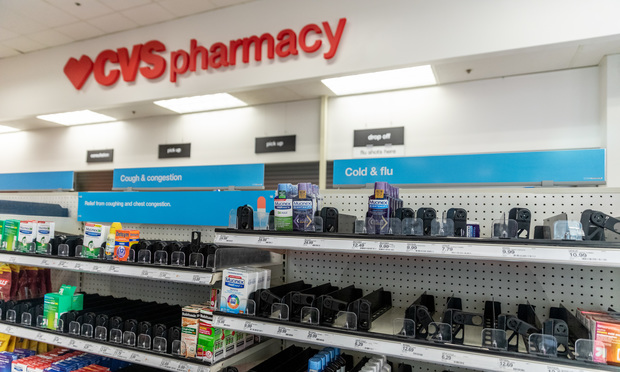As 'Essential Businesses' in COVID-19 Outbreak, Pharmacies Seek Delays in Opioid Case
"An extension of deadlines is particularly warranted given pharmacy defendants' own involvement in the emergency responses to this unprecedented public health crisis," wrote lawyers for Walmart, CVS and Rite Aid.
March 31, 2020 at 03:51 PM
6 minute read
 At Daly City's Target store in the Bay Area shelves are picked over and deserted. Including signs posted on the pharmacy stating no masks or hand sanitizer, gloves or alcohol available. (Photo: Jason Doiy/ALM)
At Daly City's Target store in the Bay Area shelves are picked over and deserted. Including signs posted on the pharmacy stating no masks or hand sanitizer, gloves or alcohol available. (Photo: Jason Doiy/ALM)
Pharmacies set to go to trial this fall over the opioid crisis have sought a 60-day delay in discovery and deposition deadlines in light of the COVID-19 outbreak.
In a March 23 motion, the pharmacies, which include Walmart, CVS and Rite Aid, cited "unprecedented quarantine and mitigation measures" forcing their lawyers to stay in their homes, some with child care responsibilities, as well as their unique roles in addressing the pandemic.
"An extension of deadlines is particularly warranted given pharmacy defendants' own involvement in the emergency responses to this unprecedented public health crisis," wrote lawyers for the pharmacies. They noted that retail pharmacies are "essential businesses" that remain open and Walmart, Walgreens, CVS and Rite Aid are converting their parking lots into COVID-19 testing sites for medical workers and first responders.
Lawyers on the plaintiffs' executive committee have opposed the motion but suggested that counsel "hold the current litigation deadlines" and reevaluate the situation on April 20.
"There is no denying the public health emergency that is COVID-19, but the ultimate impact of the virus and the extent and duration of the emergency are unknown," they wrote in a March 25 response. "The pharmacy defendants should not be permitted to use their role in responding to the COVID-19 health crisis as an excuse to further delay discovery and trial of the opioid health crisis."
Lawyers for the pharmacy defendants—CVS, Rite Aid, Walgreen Co. and Walmart Inc.—either declined to comment or did not respond to requests for comment.
A lawyer for defendant Giant Eagle, which operates grocery stores and pharmacies, said his client requested the delay after the "unprecedented surge in the demand for pharmacy products and grocery products."
"Giant Eagle and the other pharmacy defendants are devoting substantial resources and manpower to fill these needs during this national crisis and are experiencing significant manpower shortages," wrote Robert Barnes, of Marcus & Shapira in Pittsburgh, Pennsylvania. "Giant Eagle's resources are solely focused on doing everything it can to support the urgent needs of the communities in which it operates. Team members from all areas of its business, including many who are instrumental to Giant Eagle's defense in this case, are spending significant time in the grocery stores, pharmacies, warehouses and prescription fulfillment centers in order to make available the foods, prescriptions and other goods that are currently in the greatest need."
A lawyer for another defendant, Discount Drug Mart Inc., noted that the motion did not request delaying the Nov. 9 trial date, even though "extending the deadlines may have an effect upon the trial date, but that can be dealt with later after we, hopefully, get past these troubled times."
"My client is working at full capacity (probably overcapacity) dealing with the novel issues that have been thrown at them by COVID 19," wrote Tim Johnson, of Cavitch Familo & Durkin, in an email. "The pharmacies are on the frontline of this crisis. Our employees, from top to bottom, are working overtime to service our customers at this time of need. We will not put the safety of our customers and employees at risk, not even for this litigation."
Plaintiffs' executive committee co-lead counsel Paul Farrell of Farrell Law, Paul Hanly of Simmons Hanly Conroy and Joe Rice of Motley Rice, said in an emailed statement: "While the extent of damage and duration of the virus are still unknown, what we do know is that the opioid epidemic has been, and continues to be, an unprecedented catastrophe for communities around the country. The opioid epidemic—which the President declared to be a public health emergency as of 2017—takes more lives every day and has already killed hundreds of thousands of Americans. We are following the latest guidance from public officials and continue to take every precaution to ensure those around us remain safe and healthy while we move full steam ahead on all fronts to secure recovery resources for the thousands of communities who need them now more than ever."
They added that they were available to discuss with the defendants "how to overcome the logistical challenges presented by the current crisis."
The opioid trial is among several cases facing delays in light of COVID-19, which has prompted numerous court closures and forced lawyers and judges to communicate through videoconferencing.
U.S. District Judge Dan Polster had issued a case management order on March 19 that set deadlines for most document production for April 24 and depositions this summer. Polster, of the Northern District of Ohio, where Gov. Mike DeWine issued a "stay at home" order on March 22, has not yet ruled on the motion to extend those deadlines.
"The restrictions resulting from COVID-19 make it impossible to meet these deadlines," lawyers for the pharmacies wrote in their motion. They noted that to defend their case, they needed discovery from federal government agencies, doctors and others in the health care system.
"But those parties—including CDC, FDA, and HHS—understandably and necessarily are occupied with responding to a rapidly developing crisis in which time is genuinely of the essence," they wrote.
Plaintiffs' lawyers countered that they had "developed a comprehensive deposition protocol" that would allow both sides to move forward on discovery and depositions.
"The protocol will solve the logistical problem posed by COVID-19 in a workable fashion, and in a way that does not needlessly slow this important case down," they wrote.
In a separate consolidated class action brought on behalf of opioid-addicted babies, lawyers for plaintiffs and defendants, including pharmacies, sought a 60-day delay in deposition and briefing deadlines due to "significant obstacles created by the COVID-19 response."
Polster granted that request on March 16, which the pharmacies cited in their motion to delay the pretrial deadlines.
In his email, Johnson, the lawyer for Discount Drug Mart, said Polster was unlikely to grant the motion.
"Although the judge has not formally ruled on our motion, the directives that were issued through the Special Master essentially have the same effect," he wrote. "We felt that our motion to extend deadlines was reasonable and necessary under the circumstances. We are disappointed that the judge seems to be heading in a different direction, possibly because plaintiffs opposed our motion, even though the federal government, the state government and most counties and municipalities have shut down their own unessential functions and issued orders for the private sector to do the same. It seems to smack of 'do as I say, not as I do.'"
This content has been archived. It is available through our partners, LexisNexis® and Bloomberg Law.
To view this content, please continue to their sites.
Not a Lexis Subscriber?
Subscribe Now
Not a Bloomberg Law Subscriber?
Subscribe Now
NOT FOR REPRINT
© 2025 ALM Global, LLC, All Rights Reserved. Request academic re-use from www.copyright.com. All other uses, submit a request to [email protected]. For more information visit Asset & Logo Licensing.
You Might Like
View All
Apple Files Appeal to DC Circuit Aiming to Intervene in Google Search Monopoly Case
3 minute read
A Plan Is Brewing to Limit Big-Dollar Suits in Georgia—and Lawyers Have Mixed Feelings
10 minute read
Law Firms Mentioned
Trending Stories
- 1Uber Files RICO Suit Against Plaintiff-Side Firms Alleging Fraudulent Injury Claims
- 2The Law Firm Disrupted: Scrutinizing the Elephant More Than the Mouse
- 3Inherent Diminished Value Damages Unavailable to 3rd-Party Claimants, Court Says
- 4Pa. Defense Firm Sued by Client Over Ex-Eagles Player's $43.5M Med Mal Win
- 5Losses Mount at Morris Manning, but Departing Ex-Chair Stays Bullish About His Old Firm's Future
Who Got The Work
J. Brugh Lower of Gibbons has entered an appearance for industrial equipment supplier Devco Corporation in a pending trademark infringement lawsuit. The suit, accusing the defendant of selling knock-off Graco products, was filed Dec. 18 in New Jersey District Court by Rivkin Radler on behalf of Graco Inc. and Graco Minnesota. The case, assigned to U.S. District Judge Zahid N. Quraishi, is 3:24-cv-11294, Graco Inc. et al v. Devco Corporation.
Who Got The Work
Rebecca Maller-Stein and Kent A. Yalowitz of Arnold & Porter Kaye Scholer have entered their appearances for Hanaco Venture Capital and its executives, Lior Prosor and David Frankel, in a pending securities lawsuit. The action, filed on Dec. 24 in New York Southern District Court by Zell, Aron & Co. on behalf of Goldeneye Advisors, accuses the defendants of negligently and fraudulently managing the plaintiff's $1 million investment. The case, assigned to U.S. District Judge Vernon S. Broderick, is 1:24-cv-09918, Goldeneye Advisors, LLC v. Hanaco Venture Capital, Ltd. et al.
Who Got The Work
Attorneys from A&O Shearman has stepped in as defense counsel for Toronto-Dominion Bank and other defendants in a pending securities class action. The suit, filed Dec. 11 in New York Southern District Court by Bleichmar Fonti & Auld, accuses the defendants of concealing the bank's 'pervasive' deficiencies in regards to its compliance with the Bank Secrecy Act and the quality of its anti-money laundering controls. The case, assigned to U.S. District Judge Arun Subramanian, is 1:24-cv-09445, Gonzalez v. The Toronto-Dominion Bank et al.
Who Got The Work
Crown Castle International, a Pennsylvania company providing shared communications infrastructure, has turned to Luke D. Wolf of Gordon Rees Scully Mansukhani to fend off a pending breach-of-contract lawsuit. The court action, filed Nov. 25 in Michigan Eastern District Court by Hooper Hathaway PC on behalf of The Town Residences LLC, accuses Crown Castle of failing to transfer approximately $30,000 in utility payments from T-Mobile in breach of a roof-top lease and assignment agreement. The case, assigned to U.S. District Judge Susan K. Declercq, is 2:24-cv-13131, The Town Residences LLC v. T-Mobile US, Inc. et al.
Who Got The Work
Wilfred P. Coronato and Daniel M. Schwartz of McCarter & English have stepped in as defense counsel to Electrolux Home Products Inc. in a pending product liability lawsuit. The court action, filed Nov. 26 in New York Eastern District Court by Poulos Lopiccolo PC and Nagel Rice LLP on behalf of David Stern, alleges that the defendant's refrigerators’ drawers and shelving repeatedly break and fall apart within months after purchase. The case, assigned to U.S. District Judge Joan M. Azrack, is 2:24-cv-08204, Stern v. Electrolux Home Products, Inc.
Featured Firms
Law Offices of Gary Martin Hays & Associates, P.C.
(470) 294-1674
Law Offices of Mark E. Salomone
(857) 444-6468
Smith & Hassler
(713) 739-1250









